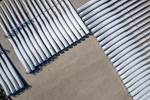EOLIAN kicks off bio-based wind blade development
EU project will develop bio-based, repairable and recyclable vitrimer composites and advanced sensors for highly reliable, sustainable wind blades.
EOLIAN is a 3.5-year EU-funded project — June 2024 to November 2027 — aiming to develop a new generation of smart, sustainable wind turbine blades with longer lifetime, improved reliability and higher sustainability. Project kick-off brought together partners to discuss work packages and the activities planned for the coming months. The project’s social media channels and website will be launched later this year.
EOLIAN blades will be repairable and recyclable with integrated sensors to enable structural health monitoring (SHM). This will be achieved by using:
- Bio-based, reparable, recyclable vitrimer composites with basalt fibers (natural mineral fibers produced from volcanic basalt rock)
- Recyclable sensors and actuators
- Advanced multi-scale modeling
- LCA-based environmental analysis
Project coordinator is Proplast (Italy), supported by consortium partners Politecnico di Milano (Italy), Zorlu Holding (Turkey), IRES – Innovation in Research and Engineering Solutions (Belgium), Norvento Enerxía (Spain), Tekniker (Spain), AEP Polymers (Italy), Entelea (U.K.), The European Composites Industry Association (EuCIA) and Brunel Composites Centre (BCC, U.K.). Together, these companies bring experts in vitrimer chemistry, SHM in the wind industry, composite materials, and dissemination and exploitation. EuCIA will lead Work Package 8: Dissemination and Exploitation, which will disseminate the project’s results, develop exploitation strategies and a roadmap for commercialization.
EOLIAN will develop sustainable vitrimer composites incorporating >60% bio-based vitrimer, as well as aim to replace synthetic fiberglass reinforcement with basalt fibers. More, the project will manufacture a prototype sensor-assisted vitrimer composite blade 14 meters in length to demonstrate the technologies developed by the project.
According to EuCIA, the use of vitrimers will pave the way to different end-of-use solutions for wind blades, which will be studied as part of the project. Vitrimer composites exhibit similar mechanical properties to thermoset composites but they can be reprocessed after cure, which enables the reuse of parts by heating and simple reshaping (thermoforming; read “Vitrimers: The reprocessable thermoset”). Chemical recycling allows the separation of the vitrimer matrix and fiber, with the potential to reuse both materials in the wind energy sector. When the end-of-use part is considered low quality, it can be shredded mechanically and the recycled materials molded into other applications simply by reheating.
Related Content
-
Composites end markets: Electronics (2024)
Increasingly, prototype and production-ready smart devices featuring thermoplastic composite cases and other components provide lightweight, optimized sustainable alternatives to metal.
-
Recycling hydrogen tanks to produce automotive structural components
Voith Composites and partners develop recycling solutions for hydrogen storage tanks and manufacturing methods to produce automotive parts from the recycled materials.
-
Microwave heating for more sustainable carbon fiber
Skeptics say it won’t work — Osaka-based Microwave Chemical Co. says it already has — and continues to advance its simulation-based technology to slash energy use and emissions in manufacturing.
















